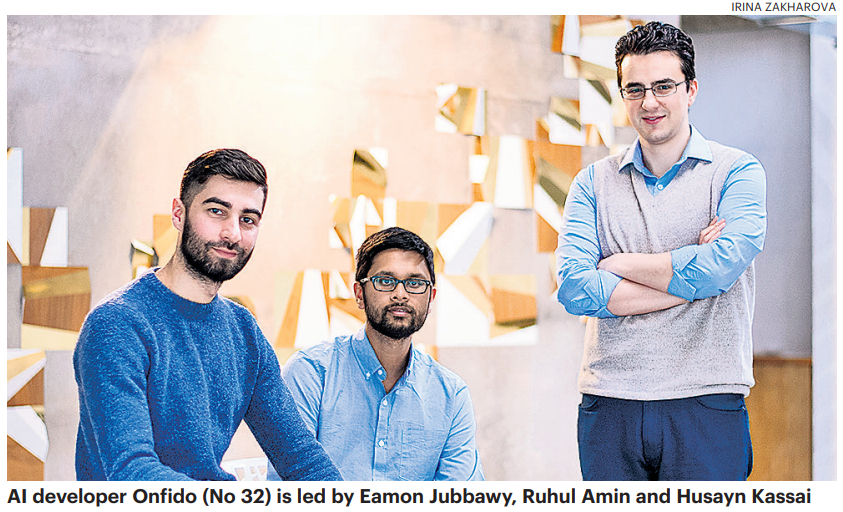



Artificial Intelligence Accelerates to Meet New Demand – Tech Track 100 2020
The digital transformation of the UK economy was accelerating fast at the beginning of the year, and Covid-19 has only increased the pace of change. Some companies on this year’s Tech Track 100 have found the market for their products and services booming; and others are innovating rapidly due to the changes driven by working from home or remotely.
Onfido (No 32), one of eight artificial intelligence (‘AI’) companies on the league table, illustrates the trend. Onfido lets online businesses and banks remotely sign up customers in seconds, using a selfie and a picture of an approved ID. Sales rocketed from £4m in 2016 to £28m last year, and this July it reported quarterly sales up 40% year-on-year.
In April, Manchester-born co-founder and chief executive, Husayn Kassai, 30, offered free help to charities and not-for-profit companies to register volunteers in the fight against Covid-19. The same month, Onfido secured $100m (£75m) in new investment from TPG Group (which backs Airbnb and Uber), bringing total investment to more than $200m.
Onfido is also working on producing digital health passports: an example of many applications that heavyweight investors see for its AI-powered technology. Vehicle rental, car-sharing, hotel and airport check-ins, ordering prescription drugs, e-voting and remittances – businesses in all these areas would benefit from quick and easy ways to verify the identity of their customers. The power of AI to transform the speed of decision-making makes it perhaps the most exciting element of the UK’s digital transformation – and one of the most scaleable. It is shaking up not just companies, but the government too.

Dominic Cummings, the prime minister’s top advisor, is a champion of the technology, and last year the NHS announced a £250m AI laboratory. In March, Marc Warner, chief executive of London-based Faculty (No 33), the AI company he co-founded in 2014, met the government’s scientific advisory group for emergencies and produced data modelling to help respond to the pandemic.
While AI is transforming the way complex health information is gathered and shared, it also has great potential to find short-cuts to new treatments, by helping to make sense of vast data sets. In January, Exscientia (No 31), the Oxford-based AI-driven pharmaceuticals discovery company, announced the first AI-discovered drug molecule to begin human trials, and later began screening 15,000 drugs in search of a treatment for Covid-19.
Given the rapidity of digital transformation, league table companies are seeing healthy funding rounds – including Revolut (No 1), which secured $500m in February and a further $80m in July, valuing the digital bank at $5.5bn, three times its worth in 2018. There have been sizeable fundraisings during the pandemic. For instance, in June Checkout.com (No 55), the payments services provider, raised $150m, to also reach a $5.5bn valuation. However seed-stage start-ups have suffered. Data from Plexal and Beauhurst suggests they have been about a third less likely to secure funding since March.
Talk of stock market floats dried up in March, but by July it had restarted. Darktrace (No 58) – the cyber-security firm founded in 2013 and now led by Poppy Gustaffson – is viewed as a likely float next year at a valuation of over £1.5bn, and companies we talk to at Singer Capital Markets are again seriously considering IPO as an option.
The speed, efficiency and flexibility of public markets have been underlined during the pandemic: £23.7bn was raised in London in the first half of the year through IPOs and follow-ons, and public fundraisings have gone from initial idea to completion in just a week. The mechanism of a stock market, and investors who know the company well, mean that cash can be raised straightforwardly and without delay.
An example of this was Tech Track 100 alumnus essensys, which makes software for flexible workspaces; it raised £7m in April. The funds gave it balance sheet liquidity and flexibility, together with resources to take advantage of long-term opportunities when the situation stabilises.
Many of the league table companies will find the last six months has made them even more relevant than before. Examples include StarLeaf (No 85), with its video conferencing technology, and Mindful Chef (No 17), which in March reported a 452% surge in demand for its home-delivery recipe boxes.
Cloud computing, falling hardware prices, faster connectivity, and the spur given to innovation and growth by advanced communication technologies have all sped up digital transformation, to which we must now add the pandemic. With powerful forces like these in play, investor appetite for tech companies is going only one way.
The Sunday Times Sage Tech Track 100 league table ranks Britain’s 100 private tech (TMT) companies with the fastest-growing sales over their latest three years. It is compiled by Fast Track and published in The Sunday Times each September, with an awards event in November, and alumni events during the year. Singer Capital Markets have been sponsors of Tech Track for 4 years. Read more >>>
Contact us
Tim Cockroft
Founder, Equity Partner & Chief Executive Officer